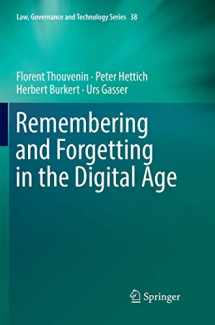
Remembering and Forgetting in the Digital Age (Law, Governance and Technology Series, 38)
ISBN-13:
9783030079680
ISBN-10:
3030079686
Edition:
Softcover reprint of the original 1st ed. 2018
Author:
Urs Gasser, Florent Thouvenin, Peter Hettich, Herbert Burkert
Publication date:
2018
Publisher:
Springer
Format:
Paperback
273 pages
FREE US shipping
Book details
ISBN-13:
9783030079680
ISBN-10:
3030079686
Edition:
Softcover reprint of the original 1st ed. 2018
Author:
Urs Gasser, Florent Thouvenin, Peter Hettich, Herbert Burkert
Publication date:
2018
Publisher:
Springer
Format:
Paperback
273 pages
Summary
Remembering and Forgetting in the Digital Age (Law, Governance and Technology Series, 38) (ISBN-13: 9783030079680 and ISBN-10: 3030079686), written by authors
Urs Gasser, Florent Thouvenin, Peter Hettich, Herbert Burkert, was published by Springer in 2018.
With an overall rating of 3.9 stars, it's a notable title among other
books. You can easily purchase or rent Remembering and Forgetting in the Digital Age (Law, Governance and Technology Series, 38) (Paperback) from BooksRun,
along with many other new and used
books
and textbooks.
And, if you're looking to sell your copy, our current buyback offer is $0.3.
Description
This book examines the fundamental question of how legislators and other rule-makers should handle remembering and forgetting information (especially personally identifiable information) in the digital age. It encompasses such topics as privacy, data protection, individual and collective memory, and the right to be forgotten when considering data storage, processing and deletion. The authors argue in support of maintaining the new digital default, that (personally identifiable) information should be remembered rather than forgotten. The book offers guidelines for legislators as well as private and public organizations on how to make decisions on remembering and forgetting personally identifiable information in the digital age. It draws on three main perspectives: law, based on a comprehensive analysis of Swiss law that serves as an example; technology, specifically search engines, internet archives, social media and the mobile internet; and an interdisciplinary perspective with contributions from various disciplines such as philosophy, anthropology, sociology, psychology, and economics, amongst others.. Thanks to this multifaceted approach, readers will benefit from a holistic view of the informational phenomenon of “remembering and forgetting”. This book will appeal to lawyers, philosophers, sociologists, historians, economists, anthropologists, and psychologists among many others. Such wide appeal is due to its rich and interdisciplinary approach to the challenges for individuals and society at large with regard to remembering and forgetting in the digital age.


We would LOVE it if you could help us and other readers by reviewing the book
Book review

Congratulations! We have received your book review.
{user}
{createdAt}
by {truncated_author}


